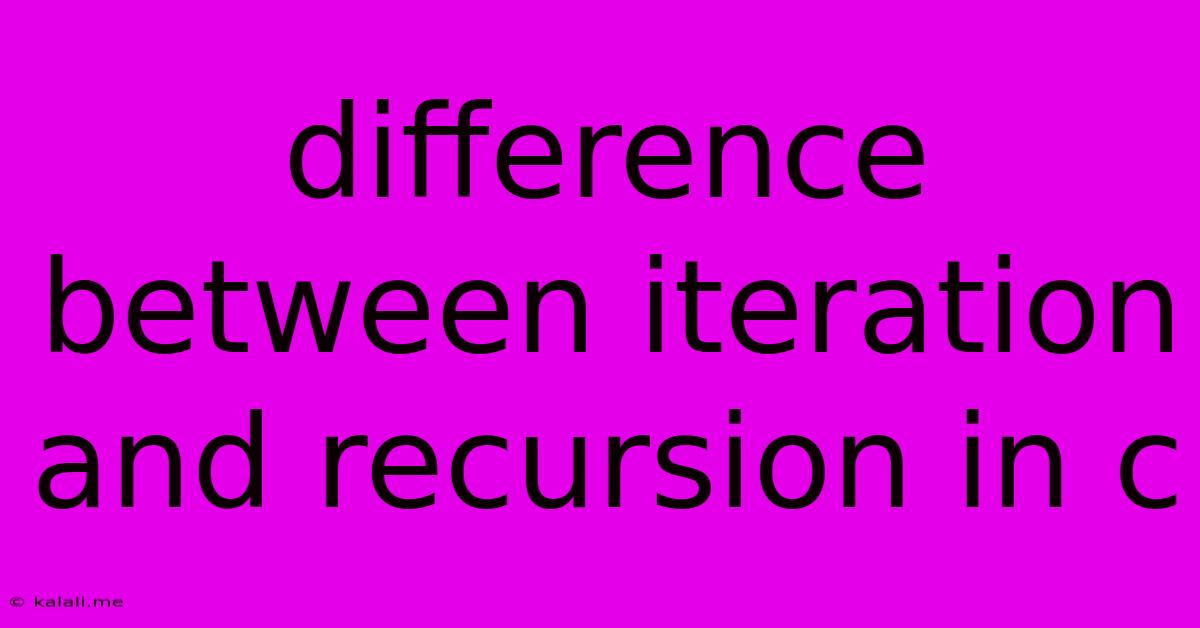Difference Between Iteration And Recursion In C
Kalali
Jun 15, 2025 · 3 min read

Table of Contents
Iteration vs. Recursion in C: A Deep Dive
Understanding the differences between iteration and recursion is crucial for any C programmer. Both are powerful control flow techniques used to repeat a block of code, but they achieve this repetition in fundamentally different ways. This article will explore the core distinctions, advantages, and disadvantages of each, helping you choose the optimal approach for your specific programming tasks.
Meta Description: This article explains the core differences between iteration and recursion in C programming, covering their mechanisms, advantages, disadvantages, and when to use each approach for optimal code efficiency.
What is Iteration?
Iteration, in the context of C programming, refers to the repeated execution of a block of code using loops like for, while, and do-while. These loops provide a structured way to control the repetition based on a condition. Iteration is generally considered a more straightforward and often more efficient approach for repetitive tasks.
Example of Iteration:
#include
int main() {
int i;
for (i = 0; i < 10; i++) {
printf("%d ", i);
}
printf("\n");
return 0;
}
This code uses a for loop to iterate ten times, printing the numbers 0 through 9.
What is Recursion?
Recursion, on the other hand, is a technique where a function calls itself within its own definition. This creates a chain of function calls, each operating on a smaller or modified version of the original problem. Recursion elegantly solves problems that can be broken down into self-similar subproblems.
Example of Recursion:
#include
int factorial(int n) {
if (n == 0) {
return 1;
} else {
return n * factorial(n - 1);
}
}
int main() {
int num = 5;
printf("Factorial of %d is %d\n", num, factorial(num));
return 0;
}
This code calculates the factorial of a number using recursion. The factorial function calls itself until the base case (n == 0) is reached.
Key Differences: Iteration vs. Recursion
| Feature | Iteration | Recursion |
|---|---|---|
| Mechanism | Loops (for, while, do-while) |
Function calling itself |
| Memory Usage | Generally lower memory overhead | Can consume significant stack memory (stack overflow risk) |
| Readability | Often more straightforward and easier to understand | Can be less intuitive for complex problems |
| Efficiency | Typically more efficient for simple tasks | Can be less efficient due to function call overhead |
| Suitable for | Simple repetitive tasks, clear termination conditions | Problems with self-similar subproblems, tree traversal |
Advantages and Disadvantages
Iteration:
- Advantages: Generally faster and more memory-efficient, easier to debug and understand.
- Disadvantages: Can be less elegant for problems that are naturally recursive (e.g., tree traversal).
Recursion:
- Advantages: Provides elegant and concise solutions for certain problems, naturally suited for recursive data structures (trees, graphs).
- Disadvantages: Potential for stack overflow errors if not carefully designed, can be less efficient than iteration for simple repetitive tasks, harder to debug for complex recursive structures.
When to Use Which?
The choice between iteration and recursion depends heavily on the nature of the problem:
-
Use iteration for: Simple repetitive tasks, when performance is critical, and when dealing with large datasets where recursion might cause stack overflow. Iteration offers better control over resource usage.
-
Use recursion for: Problems that can be naturally broken down into smaller, self-similar subproblems, such as tree traversal, Tower of Hanoi, and certain mathematical problems (e.g., factorial, Fibonacci sequence). Recursion often leads to more concise and elegant code in these scenarios.
In many cases, both iteration and recursion can achieve the same result, but one approach might be significantly more efficient or readable than the other. Careful consideration of the problem's characteristics and the potential trade-offs is essential for choosing the optimal method. Always prioritize code clarity and maintainability.
Latest Posts
Latest Posts
-
Is Milk Of Magnesia A Base Or An Acid
Jun 15, 2025
-
Which Two Of The Following Statements Are True Regarding Firewalls
Jun 15, 2025
-
Does Santa Clara University Require Sat
Jun 15, 2025
-
Gpa Requirements For Eastern Michigan University
Jun 15, 2025
-
Air Is An Element Compound Or Mixture
Jun 15, 2025
Related Post
Thank you for visiting our website which covers about Difference Between Iteration And Recursion In C . We hope the information provided has been useful to you. Feel free to contact us if you have any questions or need further assistance. See you next time and don't miss to bookmark.